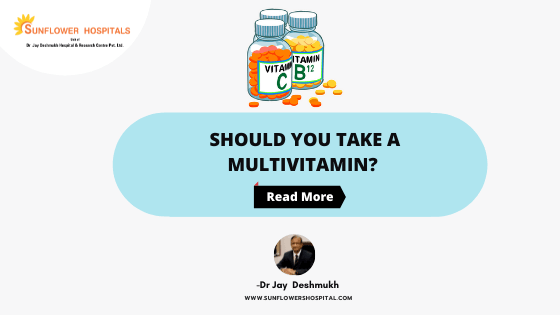Are multivitamins really necessary for good health?
Can multivitamins delay aging, prevent heart attacks or increase memory or prevent hair loss?
Do they help to increase or reduce weight or is it just a big marketing gimmick?
There are some experts who suggest that a multi-vitamin pill may benefit you and there are other experts who believe that taking multivitamins is unnecessary!
What should we do?
Many believe that a cocktail of multivitamins or minerals may help to increase longevity. Though there is no robust evidence to suggest that, there are neither any major risks as of now Dr. Sesso at Harvard School of Public health considers taking a multivitamin as a part of a healthy lifestyle. Multivitamins are low-cost, low-risk medications. It may help to fill potential gaps in the diet which people may have. There are compelling reasons to take multivitamins for retinal disorders or during cancer treatment or in individuals who have ailments like chronic diarrhea, alcoholism, chronic liver and kidney diseases, and after bariatric surgery.
What about multivitamins in heart disease?
Heart disease is a leading cause of death worldwide. Research does not support the utility of multivitamins in heart disease. The Physician’s health study investigated the effects of daily multivitamin use in over 19000 middle-aged male doctors over a decade and found no reductions in heart attacks, brain strokes, or early death. However, women taking multivitamins for at least 3 years showed a lower incidence of death from heart attacks.
What about multivitamins and cancer?
The evidence of using multivitamins and cancer prevention is again a mixed bag! Some studies suggest no effect on cancer risk, while others indicate an increased risk! There is no clear-cut evidence to suggest reduced cancer risk in middle-aged individuals taking multi-vitamins. A diet high in fiber, fruits, and vegetables may certainly be more beneficial. Equally beneficial would be regular exercises and avoidance of toxic substances like smoking or alcohol.
What about multivitamins and eye health?
Age-related macular degeneration is one of the leading causes of blindness worldwide. One study indicated that multivitamins and antioxidants may reduce and slow the progression of macular degeneration.
How can multivitamins harm you?
You may just be feeling weak or exhausted. You may have a low appetite or you may be gaining weight. You may have muscle pain or cramps or may have joint pains. Most individuals may like to pop up a pill of multivitamins to reduce these symptoms. However many may have an undiagnosed thyroid disorder, arthritis, diabetes or kidney or liver disease, or even tuberculosis. It is better to be properly evaluated by your doctor in these situations, for there is a possibility of an underlying disease that may be diagnosed quite late.
What are the common side effects of multivitamins?
Some individuals may have constipation, diarrhea upset stomach, or nausea. Rare side effects may include headaches, gout, sleep deprivation, or nose bleeds. Multivitamins far in excess of daily recommendations can cause various side effects.
What about specific vitamin deficiencies?
Young malnourished individuals may suffer from a variety of vitamin deficiencies. They would be benefitted from multivitamins. B 6 or Pyridoxine may help those who have anti-tuberculosis treatment. Vitamin D is necessary for osteoporosis and rickets. Chronic alcoholics may require multivitamins including thiamine. Selenium may be necessary after bariatric surgery to maintain proper heart function. Folic acid is a must in pregnancy and in sickle cell disease. Multivitamins should never be considered as a magic bullet to maintain good health. In fact, a balanced diet rich in fruits, vegetables, legumes, and specific dairy products would be more beneficial. Regular physical activity and a happy outlook towards life are a better source of energy and wellness than multivitamins


